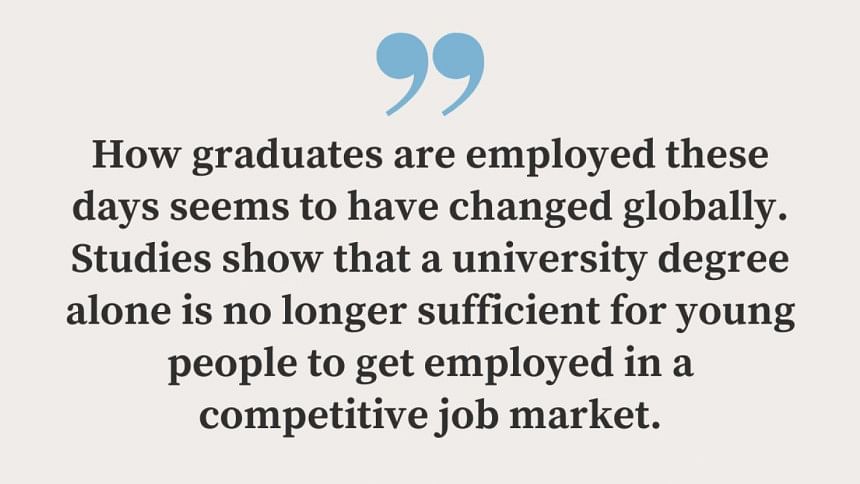How can graduates in Bangladesh become more employable?

Lack of graduate employability has become a critical issue among higher education providers and employers in many places around the world. There are studies that have found several factors to be significant determinants in enhancing graduate employability. However, few such studies have been conducted considering the situation in Bangladesh, where a large number of students graduate from public and private institutions every year. Recently, I along with some other researchers conducted a questionnaire survey to examine the determinants of graduate employability in Bangladesh. Using the purposive sampling technique, survey data was collected from final-year students and recent graduates. The results showed that career education, interpersonal skills, and information technology (IT) knowledge significantly enhanced graduate employability.
Graduate employability is defined as the accumulation of various abilities and skills that graduates acquire during their study lives to gain a desirable job and become successful in their careers. In general, it refers to skills and abilities that individuals can use to attain employment, find a new job, fulfil employment requirements, and be satisfied with the designated career. Soft skills are defined as a combination of personality traits, goals, preferences, and motivations demanded and valued in the labour market, at school, and in many other fields. They are what make an individual a good employee and a companionable co-worker.
How graduates are employed these days seems to have changed globally. Studies show that a university degree alone is no longer sufficient for young people to get employed in a competitive job market. On the other hand, employers are slimming down their workforces due to unstable and unpredictable business situations caused by the Covid-19 pandemic and other external factors. Employers decide to recruit graduates based on their abilities and qualities, in addition to knowledge and skills relevant to a particular discipline. Graduate employability is no longer a concept that includes only the skills and attributes gained during the study period in higher educational institutions. It also includes the university's academic reputation, communication skills, teamwork, problem-solving skills, and so on.
In these circumstances, universities have begun integrating employability traits in their courses and programmes. This initiative has led researchers to explore the employability qualities sought by employers in a particular context. Employers generally tend to emphasise generic and practical skills in the recruitment process instead of academic results and technical expertise.
However, Bangladeshi graduates appear to be inadequately equipped with such knowledge and skills. Many students don't think about their potential career paths, nor seek assistance, until graduation. In this situation, higher education institutions should undertake strategies to affirm students' involvement with career education at the beginning of their university experience.

The findings of our study strengthen the arguments regarding the significance of interpersonal skills, IT skills and career education for graduate employability. Interpersonal skills exhibit the tendency and qualities to respond and deal with challenging situations with a better communication process. And IT skills are time-demanding skills. Recruiters expect all graduates to have basic and advanced IT skills that can be useful in every aspect of their careers. Added to that is career education, which posits a significant relationship with graduate employability. Therefore, a career-related course can be introduced in all programmes for final-year students.
Basic literacy is expected to be a common phenomenon for graduates, but this has not been found as a significant factor in the context of Bangladesh. In this regard, it can be argued that recruiters might not put basic literacy as an important factor during the recruitment process and students find it common for all university students. Therefore, basic literacy was not found as a significant attribute in enhancing graduate employability.
The findings of our study advance our understanding of some under-research antecedents of graduate employability, such as basic literature, career education, IT skills, and interpersonal skills. This study also suggests that both current students and graduates of higher education institutions must improve their IT, career-related knowledge or education, and interpersonal skills so that they can be more employable. In this competitive world, technological skills or IT skills are essential to adapt to the rapidly changing work environment.
The findings of our study may enable the authorities of higher education institutions in Bangladesh to re-evaluate their curricula to gauge gaps for further improvement. Meanwhile, undergraduate students will be aware and expected to make conscious efforts to seek ways of involving their learning within and outside of the university system. Thus, they can develop and acquire employability skills necessary to gather competitive advantage and fulfil the current job market requirements.
However, the study has some limitations that should be taken into consideration. First of all, data was gathered online only, and it wasn't possible to get in contact with a large number of students in different locations. The Covid-19 restrictions did not allow the collection of physical survey responses. We hope there would be future studies which would not face such limitations, and would get data in large volumes.
Md Hasan Shimum Wahab is pursuing a PhD at Putra Business School of Universiti Putra Malaysia (UPM).

 For all latest news, follow The Daily Star's Google News channel.
For all latest news, follow The Daily Star's Google News channel. 










Comments